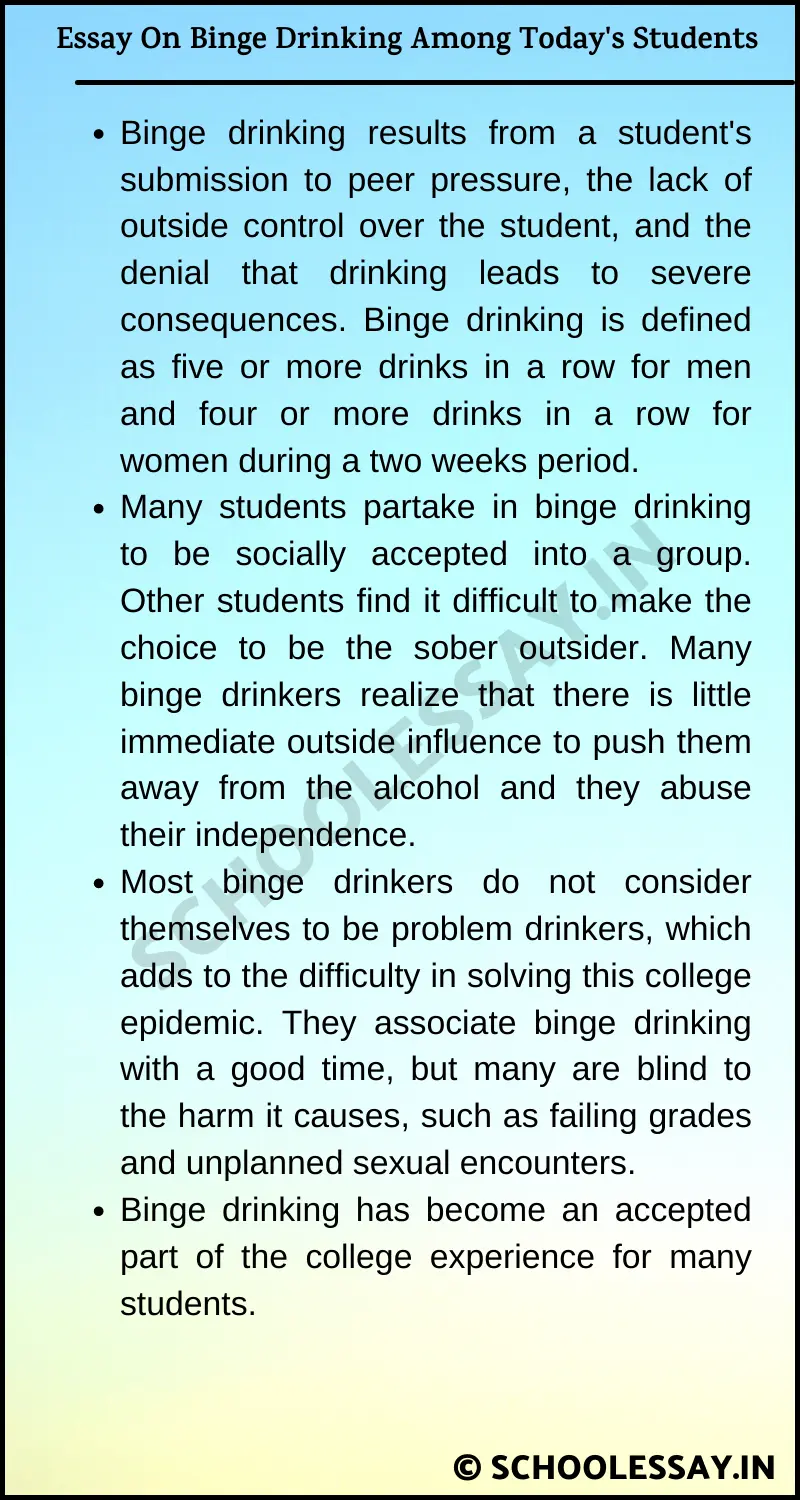Essay On Binge Drinking Among Today’s Students
Binge drinking results from a student’s submission to peer pressure, the lack of outside control over the student, and the denial that drinking leads to severe consequences. Binge drinking is defined as five or more drinks in a row for men and four or more drinks in a row for women during a two weeks period.
Many students partake in binge drinking to be socially accepted into a group. Other students find it difficult to make the choice to be the sober outsider. Many binge drinkers realize that there is little immediate outside influence to push them away from the alcohol and they abuse their independence.
Most binge drinkers do not consider themselves to be problem drinkers, which adds to the difficulty in solving this college epidemic. They associate binge drinking with a good time, but many are blind to the harm it causes, such as failing grades and unplanned sexual encounters.
Binge drinking has become an accepted part of the college experience for many students. Although there are other reasons a student may choose to binge drink, the influence of friends, the lack of outside control and the denial of drinking-related problems are the main forces driving the need to consume alcohol to the point of physical harm.
The desire to be social enhances the willingness to binge drink. Social drinking has become a necessary activity at most weekend college parties. Students seek information about the type of alcoholic beverages available prior to attending a party. Having a few drinks has become synonymous with having a good time.
A high tolerance for alcohol gains the respect of peers. Those that throw up after a few drinks are ridiculed, including women. Binge drinking rates are the highest among members of fraternities and sororities, which demonstrates the need to drink to fit in with peers. It is questioned whether Greek life attracts or creates binge drinkers. “Many fraternities and sororities are functional saloons, Fully 86% of KNOCY men and 80% of women who live in fraternities and sororities are binge drinkers,”.
Unfortunately, the vast majority of students are unaware that their need to fit in with friends and inability to make individual decisions causes them to have dangerous drinking habits. Another circumstance that influences college binge drinking is the lack of outside control over the college student, For children, parents exert that control. As older adults, that control may come in the form of a spouse or employer.
However, while in college, many individuals find themselves on their own for the first time and are unable to exercise self-control when it comes to alcohol abuse. “Social control over drug and alcohol abuse is at its lowest point in the modern American human life cycle during the college years,”.
This inability to establish self control coupled with the novel environment of the university can be a destructive mixture. Students overwhelmed with the demands of academic life may believe that the use of alcohol is a legitimate method of coping with pressure. They use alcohol as a prescription for stress, anxiety and boredom.
Unfortunately, the transition from school to college often leads individuals to become first time bingers. “Campus binging rates influence the drinking behavior of students once they arrive at college,”. In order to avoid the perils of binge drinking. students must be equipped with a strong self identity and the desire to take full responsibility of university life without relying on outside control.
The extreme denial that the alcohol can cause severe problems lies at the root of the college binge drinking crisis. Once students have an established binge drinking habit, they do not want to believe that something that helps them forget their responsibilities could be harmful. The alcohol begins to take on the role of a friend.
Drinking, like a friend, comforts the distressed student when times get rough. Binge drinking differs from alcoholism because it is not a physical dependency on alcohol. Students think the drinking is under control because this physical dependency is absent.
However, with binge drinking, a psychological dependency works to the detriment of the drinker. In many situations, binge drinking goes undetected because people believe if their friends are engaging in the same drinking habits, they must be acceptable.
Women who regularly compare their drinking to men’s drinking are more likely to underestimate the severity of their drinking. The denial of the harm inherent in binge drinking stems from the student’s anxiety to admit drinking creates difficulties, rather than eliminates them.
Binge drinking can lead to multiple negative effects for the drinker and those who are part of the drinker’s life. The binge drinker experiences health, social and academic problems. An alarming 42% of frequent bingers reported having an unplanned sexual encounter, while 46% got behind in their studies and 90% experienced a hangover as a result.
On high-binging campuses, students reported having to care for an intoxicated friend and having their studying and sleep interrupted. Some reported sexual and physical assault. The second-hand effects of alcohol abuse are as much a problem as those caused directly to the drinker. Dealing with the psychological causes of binge drinking would eliminate the destructive effects it can have upon an individual’s life.
The opportunity to over indulge in alcohol is a reality for a significant number of college students. Deciding what role alcohol will play is a choice that every student must make. Having friends who drink, a lack of control from outside sources and the denial of the consequences of binging are not excuses for drinking excessively.
Drinking with friends can seem more enticing than studying, feeling stressed out, bored or lonely, but as many students find out, the consequences are not worth the short-term relief.
In reality, the poignant regret of an unplanned sexual encounter or failing grades outweighs any momentary negative feelings. Drinking as a result of any of these causes demonstrates a weakness in character and the inability to make educated decisions.

ALSO READ:
- Essay On Annual Sports Meet in My School
- Essay On An Ideal Teacher
- Essay On Annual Day
- Essay On An Unwelcome Guest
- Essay On An Indian Wedding
- Essay On An Ideal Principal
- Essay On Are We Happier Than Our Forefathers
- Essay On An Ideal School
- Essay On An Indian Village
- Essay On Beauty Is Only Skin Deep


